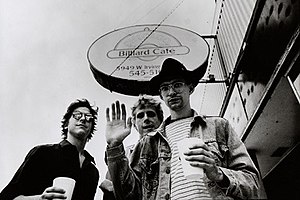Rapeman
This article needs additional citations for verification. (September 2010) |
Rapeman | |
|---|---|
 Rapeman circa 1988 | |
| Background information | |
| Origin | Chicago, Illinois, U.S. |
| Genres | Post-hardcore, noise rock |
| Years active | 1987–1989 |
| Labels |
|
| Associated acts | |
| Past members |
|
Rapeman was short-lived American noise rock band founded in 1987 and disbanded in 1989. It consisted of Steve Albini (formerly of Big Black) on guitar and vocals, David Wm. Sims (formerly of Scratch Acid and simultaneously of The Jesus Lizard) on bass and Rey Washam (formerly of Scratch Acid and Big Boys) on drums. Their sound was also described by some as post-hardcore.[1] Rapeman were formed as a parallel sister project to The Jesus Lizard, although they outlasted Rapeman by several years.
History[]
Rapeman was formed in 1987 when drummer Rey Washam and bassist David Wm. Sims relocated to Chicago from Texas after the breakup of their band Scratch Acid.[2] Steve Albini had just ended his group Big Black,[2] and was looking to switch to a musical project with a live drummer, instead of his Roland TR-606 drum machine.
Rapeman's initial 1988 releases included the mostly live recorded Budd EP, the "Hated Chinee b/w Marmoset" 7" single, and their sole album, Two Nuns and a Pack Mule.[2] The band recorded in Albini's own home studio, often giving production credit to someone named Fluss, later revealed to be Albini's cat.
All were originally released on Touch and Go Records in the US, Blast First! in the UK and Au Go Go in Australia. Rapeman left Blast First! in 1990 after Albini had an argument with the label over the release of a Big Black record. Touch and Go started distributing in the UK in 1992 and re-released Rapeman's records there.
The band's final record before their breakup, the "Inki's Butt Crack" 7" single, was issued in 1989,[2] as part of the Sub Pop Singles Club.
Name controversy[]
The band's name was controversial. In an interview, Albini reported that "'Rapeman' is ... the title character in a Japanese comic book that I had come across through a friend of mine. The comic book is just a total mind-bender. There's a whole genre of comics in Japan, rape stories where women are raped in really graphic detail for whatever reason".[3] Albini and Washam became "sort of obsessed" with the comic, and named their new group after the titular satirical anti-hero.
Rapeman's performances would often be the target of protesters who felt that the band was mocking, or even encouraging, rape and violence against women. Albini rejected such criticisms, arguing that punk ideology is generally very sympathetic to feminism, and stated that he feels that "[i]t is imperative for an artist to be honest, to respect the creative impulse, wherever that may go. Anything less is just decoration or inconsequential humming. Sometimes the resulting art is repugnant, but I believe the world is better for it, that it is made richer by having those thoughts explored".[4]
In a Kreative Kontrol podcast in 2014, Sims discussed always having issues with the name, saying it was "the biggest musical regret" of his life.[5]
In an April 2020 interview on the Conan Neutron's Protonic Reversal podcast, Albini expressed regret for the name of the band, saying that he did not feel he had been "held to account for being in a band called Rapeman". He added that "it was a flippant choice", calling it unconscionable and indefensible. He later likened it to getting a bad tattoo.[6]
Later projects[]
Albini later played bass with Flour before going on to form Shellac and expanding his work as a recording engineer. Sims reunited with ex-Scratch Acid vocalist David Yow to form the Jesus Lizard (with Albini recording their albums).[2] Washam went on to drum for former Chrome guitarist Helios Creed.
Discography[]
Studio albums[]
- Two Nuns and a Pack Mule (1988, Touch and Go Records/Blast First!/Au Go Go) UK Indie No. 4[7]
Singles and EPs[]
- Budd EP (1988, Touch and Go/Blast First!/Au Go Go) UK Indie No. 2[7]
- "Hated Chinee" 7" single (1988, Touch and Go/Blast First!/Au Go Go)
- "Inki's Butt Crack" 7" single (1989, Sub Pop Singles Club)[2]
References[]
- ^ Greene Jr., James (June 26, 2010). "The Weakest Cut: Siamese Dream". Crawdaddy Magazine. Archived from the original on March 6, 2011. Retrieved October 25, 2010.
[...]This is understandable, considering what end of the spectrum Albini hails from. The guy once fronted a post-hardcore outfit called Rapeman and has written too many scathing punk indictments of mainstream society to count. [...]
- ^ Jump up to: a b c d e f Colin Larkin, ed. (1992). The Guinness Who’s Who of Indie and New Wave Music (First ed.). Guinness Publishing. p. 228. ISBN 0-85112-579-4.
- ^ Interview with Steve Albini (May 6, 1994). "Steve discusses the naming of Big Black and Rapeman". Action Park, quoting Rock Names by Adam Dolgins. Archived from the original on May 5, 2007. Retrieved May 21, 2007.
- ^ "Steve Albini talks to LISTEN: "I try to be an ally in feminism"". LISTEN. Retrieved August 16, 2016.
- ^ "Ep. #92: The Jesus Lizard Week with David Wm. Sims". Kreative Kontrol (vishkhanna.com). April 18, 2014. Retrieved November 24, 2019.
- ^ "Ep150: Steve Albini (Shellac, Big Black, Rapeman)". Radioneutron.com. Retrieved May 7, 2020.
- ^ Jump up to: a b Lazell, Barry (1997) Indie Hits 1980 - 1989, Cherry Red Books, ISBN 0-9517206-9-4
- American noise rock music groups
- American post-hardcore musical groups
- Musical groups from Chicago
- Obscenity controversies in music
- Musical groups established in 1987
- Musical groups disestablished in 1989
- Touch and Go Records artists
- American musical trios